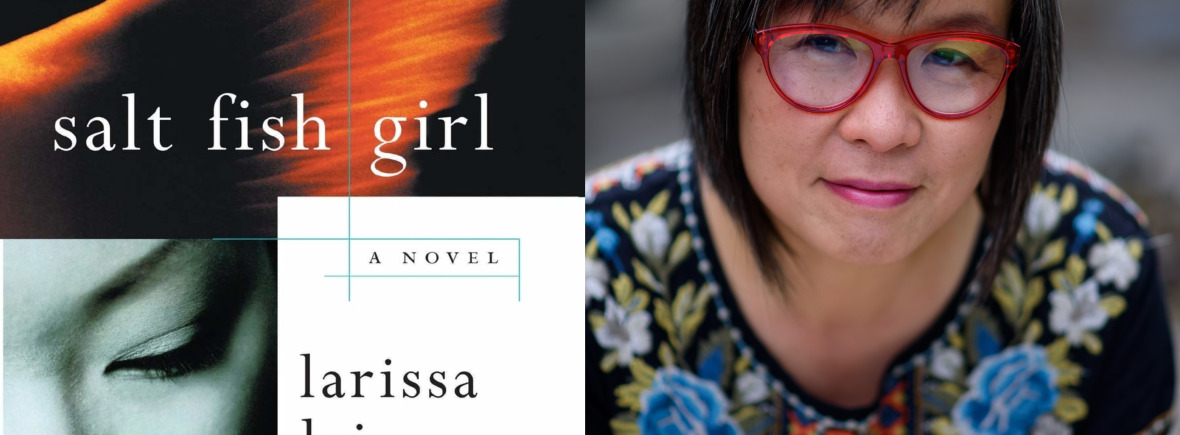 Larissa Lai has authored three novels, The Tiger Flu, Salt Fish Girl and When Fox Is a Thousand; two poetry collections, sybil unrest (with Rita Wong) and Automaton Biographies; a chapbook, Eggs in the Basement; and a critical book, Slanting I, Imagining We: Asian Canadian Literary Production in the 1980s and 1990s. A recipient of the Astraea Foundation Emerging Writers’ Award, she has been a finalist for the Books in Canada First Novel Award, the Tiptree Award, the Sunburst Award, the City of Calgary W.O. Mitchell Award, the bpNichol Chapbook Award, the Dorothy Livesay Prize and the ACQL Gabrielle Roy Prize for Literary Criticism.
Larissa Lai has authored three novels, The Tiger Flu, Salt Fish Girl and When Fox Is a Thousand; two poetry collections, sybil unrest (with Rita Wong) and Automaton Biographies; a chapbook, Eggs in the Basement; and a critical book, Slanting I, Imagining We: Asian Canadian Literary Production in the 1980s and 1990s. A recipient of the Astraea Foundation Emerging Writers’ Award, she has been a finalist for the Books in Canada First Novel Award, the Tiptree Award, the Sunburst Award, the City of Calgary W.O. Mitchell Award, the bpNichol Chapbook Award, the Dorothy Livesay Prize and the ACQL Gabrielle Roy Prize for Literary Criticism.
Larissa has been writer-in-residence at the University of Calgary, the University of Guelph and at Simon Fraser University, as well as guest professor at the University of Augsburg. At the University of British Columbia she served as Assistant Professor of Canadian Literature for seven years before relocating to the University of Calgary where she is currently Associate Professor and Canada Research Chair in the Department of English. There, she directs The Insurgent Architects’ House for Creative Writing. LiterASIAN’s Sophie Munk interviews Grace Eiko Thomson as part of a series of profiles of this year’s lineup of authors.
Ricepaper: Sybil Unrest is a collaborative long poem co-written by you and LiterAsian 2019 writer Rita Wong. What are the benefits and challenges of writing collaborative poetry, particularly at such a volatile time in history?
Larissa: In writing a poem together, Rita and I showed that poetry doesn’t have to be a solitary endeavor. Both of us are committed to the lives of communities, and writing a socially-oriented collaborative poem was one way to investigate how our collective life might be practiced in language. My new poetry book, Iron Goddess of Mercy, just out from Arsenal Pulp Press, is social in a different way. It writes letters to a range of human and nonhuman entities including maenads, echo chambers, brothers, masks, murder, and the moon. Sybil Unrest showed readers a sisterly way of being together in difference. Iron Goddess of Mercy takes up another strategy– it whirls through language in order to release grief while opening the possibility for unexpected futures to erupt.
Ricepaper: You have lived in a number of different places including California, Newfoundland, the United Kingdom, and Alberta. How have these locations and experiences affected your writing?
Larissa: I have been fortunate to live in many places, including the ones you name. And further, my roots are in Hong Kong and I lived most of my adult life in Vancouver. It’s hard to say how my writing has been affected, since I have no other life to compare this one to. But I’d say that my writing is profoundly shaped by histories of movement, both my own and that of my ancestors. I am able to recognize that there are many ways of living and many ways of being human. I am able to recognize that there are many ways of writing. I am able to attend to a range of formal practices and a range of understandings about what language does and how it works. I am able to see and be okay with contradiction.
Ricepaper: Your novel The Tiger Flu won the Lambda Literary Award for Lesbian Fiction and you received the 2020 Jim Duggins, PhD Outstanding Mid-Career Novelist Prize. What do these awards mean to you and what do you hope to see in the future of LGBTQ+ literature?
Larissa: It is a great honour to have my work recognized by both of these awards. My heart is deeply warmed to be seen by people and organizations I respect. I’m enjoying seeing new generations of LGBTQA+ literatures engaging with fabulation and literary experiments. I’m also moved by how new generations are solving problems that seemed so intractable to my generation– especially how they are addressing strife within our communities while continuing to fight homophobia and transphobia. I hope to see these strains of the work continue. I’m also hoping to see more work that builds real and grounded relationships across fields of difference, as well as work that addresses multiplicities of identity within individual writers/characters/speakers and then unsettles the notion of identity itself.
***
Larissa Lai will be at LiterASIAN 2021 as part of a panel, Intersectionality, Feminism, and Power – Writers Who Define our Times along with Grace Eiko Thomson and Sarah Suk on May 1st, 12.00 pm – 1.00 pm (PST).
Sophie Munk is a graduate of McGill University, where she majored in international development and history. She is currently a coordinator at PCHC-MoM Society, one of ACWW’s partner organizations. She has a background in community based initiatives, research, and service. She is planning on pursuing a career focusing on the relationship between culture and health governance in an international context.